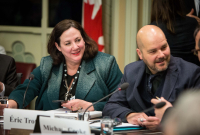Support strong Canadian climate journalism for 2025
Canada has slipped for the second straight year in an index ranking freedom of the media, in part because of police spying on journalists and demanding reporters turn over background materials.
The four-place decline to the 22nd spot overall, on top of last year's 10-spot fall, leaves Canada out of the top 20 countries in terms of media freedom, Reporters Without Borders — or RSF — said Tuesday.
In announcing its 2017 World Press Freedom Index, RSF said Canada went through a "series of scandals" last year that highlighted the importance — and fragility — of the confidentiality of journalists' sources,
Those incidents include Quebec provincial police spying on at least six journalists and seizing a reporter's computer in a raid on a newspaper. Police in Montreal obtained numerous warrants to spy on a journalist's cell phone, while the courts upheld a demand by the RCMP for a reporter to turn over background materials in a terrorism investigation.
"In all these cases, the aim was to identify sources, which journalists have a duty to protect," RSF said in the report. "The obsession with surveillance and violations of the right to the confidentiality of sources have contributed to the continuing decline of many countries previously regarded as virtuous."
The report also noted the arrest and potential lengthy jail term a reporter faces after his arrest last year covering a protest against the Muskrat Falls hydroelectric project in Labrador — a situation it called a "direct attack" on media freedom in Canada.
Among other criteria, the index ranks a country's press freedom on the diversity of opinions tolerated, independence of media, the legal environment, and abuses or violence directed at journalists. Norway topped the 2017 index, while North Korea was at the bottom.
Delphine Halgand, RSF's North America director, said an "alarming" decline in press freedom has been occurring in both Canada and the United States, which slipped two places to 43rd overall.
"Both of these countries pride themselves on their strong democratic values, which should include the freedom for journalists to report on issues of public concern without fear of reprisals," Halgand said in a statement.
"But what we are seeing is that journalists' sources are increasingly under threat, reporters are now facing jail time for covering protests, and verbal attacks meant to undermine the work of journalists are coming from some of the highest positions in government."
Canada fell 10 places in the 2016 index in what Reporters Without Borders blamed on the "dark age" for journalism under former Conservative prime minister Stephen Harper. But Vice Media reporter Ben Makuch, who is battling an RCMP production order for background materials related to articles he wrote, said the Liberal government isn't doing that much better.
"I hope Canadians start to wake up to this," Makuch said from the Washington, D.C.
Overall, the 2017 index reflects a world in which attacks on media have become commonplace, RSF said.
"We have reached the age of post-truth, propaganda and suppression of freedoms — especially in democracies," the report states. "Now, more than ever, nothing seems to be checking that fall."
The report takes aim at the United States and Britain for the "highly toxic" media bashing that occurred during Trump's rise to the U.S. presidency and the U.K. Brexit campaign. The anti-media drumbeat helped drive the world into a new era of disinformation and fake news, the report said.
"Donald Trump's repeated diatribes against the Fourth Estate and its representatives — accusing them of being 'among the most dishonest human beings on earth' and of deliberately spreading 'fake news' — compromise a long U.S. tradition of defending freedom of expression," the report states.
"The hate speech used by the new boss in the White House and his accusations of lying also helped to disinhibit attacks on the media almost everywhere in the world, including in democratic countries."
Globally, the report concludes, media freedom has never been so threatened, with the Middle East and North Africa still the world's most difficult and dangerous regions.







Comments